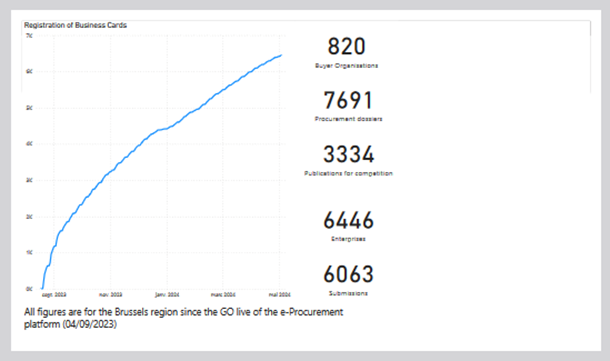The new version of e-Procurement is more intuitive and easier to use, with the aim of encouraging even more SMEs to take part in public procurement contracts.
Counting the government as a customer can be an attractive proposition for many SMEs. However, many companies do not participate in public procurement contracts.
With this in mind, the FPS Economy has launched an information campaign inviting people to discover the new version of the e-Procurement website. ‘On this digital platform, businesses can find out about the public contracts of all the Belgian authorities and take part in them,’ explains Etienne Mignolet, spokesman for the FPS Economy. ‘For several years now, professional and inter-professional organisations have been alerting the authorities to the difficulties SMEs were encountering in accessing public contracts. These problems occurred at federal and regional level, as well as at local and community level. They included heavy administrative burdens (reading specifications, preparing a bid, requirements of all kinds, submission of certificates, etc.), lack of transparency, excessively long payment periods, lack of information or knowledge (SMEs and authorities) and the complexity of procedures. This is why the federal authorities have taken initiatives to improve SMEs‘ access to public contracts’.
‘SMEs can work for the government more easily than ever’ - FPS Economy
e-Notification and e-Tendering combined
The new, more user-friendly platform was developed by the Federal Public Service for Policy and Support (FPS BOSA). It allows businesses and the public sector to organise, manage and monitor the entire public procurement procedure, entirely electronically and transparently.
From now on, it will be known as e-Procurement. It brings together the former e-Notification and e-Tendering modules on a single site. The first was used to publish contract notices, act as an auction bulletin and allow questions specific to each call for tenders to be asked. The second allowed companies to respond to invitations to tender. ‘Everything is now on the same platform,’ explains Roel Arys, head of the e-Procurement team at BOSA.
Development of the ‘Business Card’
A platform that has retained and brought together the structures of the two previous platforms, but in a more user-friendly, clearer and faster way. It has also taken into account numerous comments from both contractors and bidders. ‘The size of the tender file is no longer limited to 350 Mb, but can now be much larger. Companies responding to a contract still receive validation of their signature. But what's more, they can now view the validation of their bids under the same conditions as the buyer.
The platform has enhanced its ‘Business Card’ system, which was admittedly very rudimentary and limited. ‘It's an old feature that we want to promote and gradually improve. It's a description of the company in a few lines. For the moment, only contracting authorities can consult them when drawing up a list of tenderers to invite. Before the summer, this database will be open to everyone, even when invitations are not being issued. However, the issuer of the business card must agree to this visibility’.
Several updates of this business card are planned. To avoid publishing obsolete information, business card holders will be asked every 6 months to confirm the accuracy of their details.
The helpdesk can still be reached by telephone or e-mail. However, the latter will eventually be replaced by a contact form.
Satisfaction survey to come
But what do users think of this platform? Julien Drossart is a legal advisor at Embuild.brussels. As a specialist in public procurement, he appreciates this update. ‘In terms of the site, the regulations and the new federal charter, the changes are a step in the right direction. The old site was difficult for companies to access and understand. Now it's simpler and more practical to look for public contracts. The business card is also a great development, because it didn't exist before. But we are proposing to go further by creating fixed, standardised specifications for different types of work. For smaller contracts, there would be a single model that could be adapted to suit the specifications.
The FPS Economy is planning a satisfaction survey for the second half of this year, or even early 2025: https://bosa.belgium.be/fr/applications/e-procurement
SME Access to Public Procurement Charter
On 2 February 2024, the updated Charter on SME Access to Public Procurement was published in the Belgian Official Gazette. It sets out a series of principles and best practices to be followed by federal contracting authorities with a view to stimulating SME access to public contracts. There are 14 principles.
E-Procurement since its launch in September 2023

Registration of Business Cards: Trend over time in the registration of business cards for the municipalities of the Brussels-Capital Region (CP from 1000 to 1299)
Buyer organisations: Number of organisations registered.
Procurement dossier: Number of dossiers concerning a public contract. These files include both contracts published in the Bulletin des Adjudications and contracts processed by invitation to tender.
Publications for competition: Number of contracts published in the Bulletin des Adjudications. These contracts are/were publicly open to all bidders.
Enterprises: Number of registered enterprises.
Submissions: Number of tenders submitted for published and unpublished contracts.